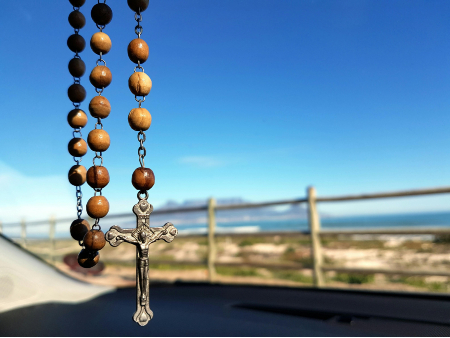We ask you, humbly: don't scroll away.
Hi readers, it seems you use Catholic Online a lot; that's great! It's a little awkward to ask, but we need your help. If you have already donated, we sincerely thank you. We're not salespeople, but we depend on donations averaging $14.76 and fewer than 1% of readers give. If you donate just $5.00, the price of your coffee, Catholic Online School could keep thriving. Thank you.Help Now >
Conscience and Catholic Politicians (Part 2 of 2)
FREE Catholic Classes
Interview With Fordham's Father Koterski
NEW YORK, APRIL 13, 2006 (Zenit) - The "statement of principles" by 55 Catholic Democrats in the U.S. House of Representatives has rekindled the debate over the responsibilities of Catholic politicians.
Signatories of the letter stated that "In recognizing the Church's role in providing moral leadership, we acknowledge and accept the tension that comes with being in disagreement with the Church in some areas."
However, Jesuit Father Joseph Koterski, professor of philosophy at Fordham University, notes that while some issues allow for varying prudential judgments, other issues deal directly with basic moral principles and thus leave less or no room for individual judgment.
Father Koterski shared with us why disagreement with Church authorities on war or immigration reform is fundamentally different from disagreement on abortion.
Part 1 of this interview appeared Tuesday on Catholic Online.
Q: Is there a distinction between a conscientious disagreement with the Church on immigration reform and disagreement on abortion?
Father Koterski: On both these questions, it seems to me, one can identify some matters of moral principle and other matters of practical judgments about the facts.
No Catholic legislator could support legislation on immigration reform that violated the moral principle that requires respect for human dignity.
But determining precisely what our immigration policies should be in order to respect human dignity turns on all sorts of practical questions, such as how many immigrants a region can really handle in any one period of time, or what the appropriate level of health care or welfare support for new immigrants should be.
There are some practical recommendations on these subjects by the U.S. Conference of Catholic Bishops, and Catholic legislators should definitely give these careful study.
I think that there is some latitude on the specific answers to these questions, whereas there is no room at all for a Catholic legislator to claim reasons on conscience as allowing support for policies that would treat immigrants, even illegal immigrants, inhumanely.
In regard to abortion, there is a similar distinction between principles and their practical application.
The Church has clearly taught that we must be opposed to procured abortion always and everywhere -- this is a universal moral principle, and on this point there are no possible grounds for disagreement with the Church based on some claims about reasons of one's own conscience.
But there remain various questions about how best to proceed on practical questions, such as on the recent initiatives to outlaw partial-birth abortion.
Here it is important to take note of the directives of "Evangelium Vitae," No. 73, on how a Catholic legislator whose unequivocal opposition to abortion is well known may still vote for legislation that does restrict some types of abortion even if it is not possible at that time completely to forbid the practice of all induced abortion.
In contrast with this careful vision of the relation of moral principles and their proper application, stands the sorry track-record of most of the individuals who signed on to the recent statement by Catholic Democrats in the House of Representatives. For many of them have voting records that the National Abortion Rights Action League considers "perfect" by virtue of their support for the pro-abortion agenda.
The assertions of that document about a commitment to protect the most vulnerable members of our society ring hollow by a comparison with the actual voting records of many of the signers.
The document's references to the "undesirability of abortion" might be thought a hopeful sign. But it is distressing to see that the farthest the signers of the document were willing to go in regard to real opposition to abortion is the document's statement that each of the signers "is committed to reducing the number of unwanted pregnancies and creating an environment with policies that encourage pregnancies to be carried to term."
 Hi readers, it seems you use Catholic Online a lot; that's great! It's a little awkward to ask, but we need your help. If you have already donated, we sincerely thank you. We're not salespeople, but we depend on donations averaging $14.76 and fewer than 1% of readers give. If you donate just $5.00, the price of your coffee, Catholic Online School could keep thriving. Thank you. Help Now >
Hi readers, it seems you use Catholic Online a lot; that's great! It's a little awkward to ask, but we need your help. If you have already donated, we sincerely thank you. We're not salespeople, but we depend on donations averaging $14.76 and fewer than 1% of readers give. If you donate just $5.00, the price of your coffee, Catholic Online School could keep thriving. Thank you. Help Now >
From the pro-abortion voting records of many of the signers it could appear that their commitment to "reducing the number of unwanted pregnancies" includes keeping abortion legally permissible.
Q: In what way is the Church's teaching on abortion binding on the individual believer in a way that the Holy Father's views on an issue such as a particular war are not?
Father Koterski: It is important to remain mindful of the distinction between: 1) universal moral precepts that bind always and everywhere and 2) judgments that one makes about the facts of a given situation.
The Church has a clear teaching on the topic of procured abortion that has been constantly affirmed and reaffirmed as a principle of morality.
The principle in question here is a universal negative precept that applies always, everywhere, and to everyone, namely, that it is never permissible to procure an abortion -- see "Evangelium Vitae," No. 62 -- because innocent human life is sacred to God and may never be deliberately attacked.
By contrast, the views of the Holy Father on an issue such as the morality of a particular war are not uttered at the level of principle but at the level of a judgment about the facts of a given situation, in light of certain principles -- here, the principles of just war.
If the Holy Father were making a comment about what the principles of just war are, he could well be articulating some universal precept, such as the precept that the aggrieved party may not go to war unless it has exhausted all other avenues to address the injustice, or the precept that even in a just war one may not directly attack the innocent.
But the question of whether a given war is just or not depends not only on adherence to the moral principles dealing with the conditions for just war, but also on all sorts of factual questions.
Because there are so many factual issues that enter into such a judgment, anyone's judgment about the matter can be considered debatable in a way that a statement of moral principles is not debatable.
The Holy Father's judgment on any such matters deserves great reverence from Catholics, but it should not be considered to be at the same level of authority as a statement that he might make on the universal moral principles.
I would go so far as to say that we should even presume that the Holy Father has better access to the facts than we do, and that this would make his judgment on factual questions likely to be better than ours.
We ask you, humbly: don't scroll away.
Hi readers, it seems you use Catholic Online a lot; that's great! It's a little awkward to ask, but we need your help. If you have already donated, we sincerely thank you. We're not salespeople, but we depend on donations averaging $14.76 and fewer than 1% of readers give. If you donate just $5.00, the price of your coffee, Catholic Online School could keep thriving. Thank you.Help Now >
But questions of fact are crucial for making the correct application of moral principles, and questions of the application of moral principles to the facts are debatable in a way that moral principles in and of themselves are not.
Q: If a Catholic politician, as a matter of conscience, finds herself in disagreement with the Church on a particular issue, how should she respond?
Father Koterski: Mindful of all that we have said above about the differences in the level of Church pronouncements on moral matters, I would urge that a Catholic politician be first of all ready to become better informed in conscience by further study and discussion of what the Church's moral principles are and what the magisterium has taught about their proper application.
When there is no more time for study and one must act, for example, by casting their votes in their roles as legislators, they need to observe the principles of divine law as superior to their own theories and opinions in matters of moral principle.
When it comes to disagreement over an application of the moral principles because of a disagreement over the facts, legislators certainly must try to ascertain the truth about those questions of fact and obey a conscience well formed by knowledge of true principles.
Contact
Catholic Online
https://www.catholic.org
CA, US
Catholic Online - Publisher, 661 869-1000
info@yourcatholicvoice.org
Keywords
Koterski, Politics, Conscience, Catholic, Moral, God
More Catholic PRWire
Showing 1 - 50 of 4,716
A Recession Antidote
Randy Hain
Monaco & The Vatican: Monaco's Grace Kelly Exhibit to Rome--A Review of Monegasque-Holy See Diplomatic History
Dna. Maria St. Catherine Sharpe, t.o.s.m., T.O.SS.T.
The Why of Jesus' Death: A Pauline Perspective
Jerom Paul
A Royal Betrayal: Catholic Monaco Liberalizes Abortion
Dna. Maria St.Catherine De Grace Sharpe, t.o.s.m., T.O.SS.T.
Embrace every moment as sacred time
Mary Regina Morrell
My Dad
JoMarie Grinkiewicz
Letting go is simple wisdom with divine potential
Mary Regina Morrell
Father Lombardi's Address on Catholic Media
Catholic Online
Pope's Words to Pontifical Latin American College
Catholic Online
Prelate: Genetics Needs a Conscience
Catholic Online
State Aid for Catholic Schools: Help or Hindrance?
Catholic Online
Scorsese Planning Movie on Japanese Martyrs
Catholic Online
2 Nuns Kidnapped in Kenya Set Free
Catholic Online
Holy See-Israel Negotiation Moves Forward
Catholic Online
Franchising to Evangelize
Catholic Online
Catholics Decry Anti-Christianity in Israel
Catholic Online
Pope and Gordon Brown Meet About Development Aid
Catholic Online
Pontiff Backs Latin America's Continental Mission
Catholic Online
Cardinal Warns Against Anti-Catholic Education
Catholic Online
Full Circle
Robert Gieb
Three words to a deeper faith
Paul Sposite
Relections for Lent 2009
chris anthony
Wisdom lies beyond the surface of life
Mary Regina Morrell
World Food Program Director on Lent
Catholic Online
Moral Clarity
DAN SHEA
Pope's Lenten Message for 2009
Catholic Online
A Prayer for Monaco: Remembering the Faith Legacy of Prince Rainier III & Princess Grace and Contemplating the Moral Challenges of Prince Albert II
Dna. Maria St. Catherine Sharpe
Keeping a Lid on Permissiveness
Sally Connolly
Glimpse of Me
Sarah Reinhard
The 3 stages of life
Michele Szekely
Sex and the Married Woman
Cheryl Dickow
A Catholic Woman Returns to the Church
Cheryl Dickow
Modernity & Morality
Dan Shea
Just a Minute
Sarah Reinhard
Catholic identity ... triumphant reemergence!
Hugh McNichol
Edging God Out
Paul Sposite
Burying a St. Joseph Statue
Cheryl Dickow
George Bush Speaks on Papal Visit
Catholic Online
Sometimes moving forward means moving the canoe
Mary Regina Morrell
Action Changes Things: Teaching our Kids about Community Service
Lisa Hendey
Easter... A Way of Life
Paul Spoisite
Papal initiative...peace and harmony!
Hugh McNichol
Proclaim the mysteries of the Resurrection!
Hugh McNichol
Jerusalem Patriarch's Easter Message
Catholic Online
Good Friday Sermon of Father Cantalamessa
Catholic Online
Papal Address at the End of the Way of the Cross
Catholic Online
Cardinal Zen's Meditations for Via Crucis
Catholic Online
Interview With Vatican Aide on Jewish-Catholic Relations
Catholic Online
Pope Benedict XVI On the Easter Triduum
Catholic Online
Holy Saturday...anticipation!
Hugh McNichol











 Daily Readings for Tuesday, April 16, 2024
Daily Readings for Tuesday, April 16, 2024 St. Bernadette: Saint of the Day for Tuesday, April 16, 2024
St. Bernadette: Saint of the Day for Tuesday, April 16, 2024 Prayer for our Family #1: Prayer of the Day for Tuesday, April 16, 2024
Prayer for our Family #1: Prayer of the Day for Tuesday, April 16, 2024
